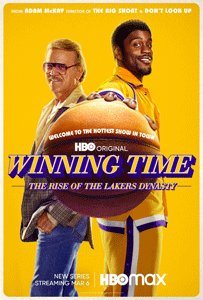“Deep fake” video technology now makes it possible for actors to look like other people. But “Winning Time: The Rise of the Lakers Dynasty” Season 1 (HBO Max) doesn’t use deep fakery. In an old-school approach, the docu-drama has actors play famous people even if they don’t resemble them. Remarkably, it doesn’t hurt the quality.
Magic, at least in spirit
Quincy Isaiah plays 20-year-old rookie Magic Johnson, but the only things he has in common with the Michigan State and Los Angeles Lakers legend are an athletic frame and a huge smile. At least Isaiah looks young. 1980-vintage Julius Erving and Spencer Haywood are played by 50-something actors.
Of course, we don’t expect lookalikes in every role (although it’s awesome that the casting department found a Larry Bird dead ringer in Sean Patrick Small). But this show’s drama is so good that I eventually accepted this person who doesn’t look like Magic Johnson as being Magic Johnson.
“Winning Time: The Rise of the Lakers Dynasty” Season 1 (2022)
HBO Max, 10 episodes
Creators: Max Borenstein and Jim Hecht, based on the book “Showtime” by Jeff Pearlman
Stars: John C. Reilly, Quincy Isaiah, Jason Clarke
The older aesthetic is supported by filtering tricks that remind us 1980 was pre-CGI, pre-flatscreen … heck, even pre-“NBA on NBC” and John Tesh. (The 1980 Finals were on CBS, and it was called the NBA World Championship Series.) Images are grained-up and desaturated to look like they were filmed in 1980, and filmstrip artifacts creep onto the screen’s edge.
In adapting Jeff Pearlman’s book (called “Showtime,” but HBO doesn’t want to call its series that, because it’s the name of its rival premium network), executive producer Adam McKay and his team capture the spirit of these Lakers – and the turn of 1979 to 1980 — rather than worrying about accuracy.
Controversial approach
This approach irks some. The IRL Jerry West demanded an apology for his portrayal by Jason Clarke as someone whose vocabulary primarily consists of “f**k” and who hates losing so much that he can’t enjoy his victories.
In “Winning Time,” West – who went from player to coach to front-office man — slams the 1972 championship trophy off the walls of his office. His Lakers beat the Knicks that year, but that doesn’t wipe out the memory of all those losses to the Celtics.
It might be unfair, but the fact that “Winning Time’s” version of West distorts the actual person doesn’t hurt my enjoyment. I don’t have a dog in the fight of whether West is portrayed warmly, and the series’ sheer entertainment value leaves me too giddy to think about it.
Besides, everyone loved the documentary “The Last Dance” (2020), and that isn’t exactly an unbiased portrait of Michael Jordan and the 1990s Bulls.
History infused with drama
That said, “Winning Time’s” on-again, off-again relationship with true history is part of the fun. I know just enough – or little enough – about NBA history that the drama sings with immediacy. I didn’t peek at Wikipedia ahead of time to find out who won Rookie of the Year or who the Lakers would meet in the finals.

Another level of enjoyment comes from the idiosyncratic stylings. I begrudgingly admired McKay’s Oscar-nominated “Don’t Look Up” (2021), but I’ve generally been lukewarm on his catalog, dating back to when I wasn’t as blown away by “Anchorman” (2004) as everyone else.
Because his work is known for words or graphics bursting into the screen to make statements (see also “The Other Guys”), I associate “Winning Time” with McKay. But he only directs episode one. In a way, he’s the Jerry Buss (Lakers owner during the Showtime era) of this project.
Character development through style
Series creators Max Borenstein (the recent “Godzilla” and “Kong” films) and Jim Hecht are more like the on-the-ground coaches, the Jack McKinnie and Paul Westhead. In this 10-episode first season (which only covers 1979-80, thus allowing for many more seasons), Borenstein co-writes every episode, Hecht co-writes three, and Rodney Barnes (call him the Pat Riley) has a hand in nine.
Along with the deliciously colorful language and hallway-stomping behavior of West, the writers try neat tricks that always land. Magic is watching the Celtics lose to the 76ers in the East finals when Bird turns to the TV camera and tells Johnson “I’m coming for you next year.”
In another moment, Buss (John C. Reilly) kicks an underling out of his office, then turns to the camera and says “What are you looking at?” “Winning Time” isn’t a faux-documentary like TV’s “The Office,” so there shouldn’t be a camera there in the scene’s internal reality.
Yet it’s a hilarious capper to that scene. A viewer is cushioned from the oddity because the cameras are handheld. But also, Borenstein and his writers are telling us Buss is off-kilter enough to rant at a camera man who isn’t really there. This stylistic touch brilliantly supports the character development.
Coaching carousel
While the arcs of sex addict Magic, spiritual Kareem Abdul-Jabbar (Solomon Hughes) and drug-addled Spencer Haywood (Wood Harris) are engaging, the most engrossing drama comes from the front office and the sidelines.
Reilly has played a lot of memorable roles (including in McKay’s “Step Brothers”), but his turn as new Lakers owner Buss is his crowning achievement. Buss is a womanizer, a financial wheeler-and-dealer barely on this side of shady, and a father who doesn’t recognize the value of his daughter (Hadley Robinson as Jeanie Buss, who now owns the Lakers). He eats shellfish shirtless while going over paperwork with his reliable but put-upon business manager, Claire (Gabby Hoffmann).
None of these negative traits – nor a sailor-on-leave vocabulary that matches West’s — cuts into his lovability.
Owning the Lakers isn’t merely a glamorous job, it’s a hard job. (And it wasn’t even glamorous in the late 1970s, when the NBA was seriously struggling.) West resigns as coach, so we follow the thrilling hiring process that leads to former Portland assistant McKinnie (Tracy Letts) — in an episode wonderfully titled “Who the F**k is Jack McKinnie?” McKinnie’s bestie, former Shakespeare teacher Westhead (Jason Segel, drawing on his meek traits), comes with the deal.
Dawn of the modern NBA
In a twist that would be hoary if it didn’t really happen, McKinnie suffers brain damage in a freak bicycle accident, and Westhead – in over his head – must steer the ship of the talent-laden (but also personality-laden) squad. As his assistant, Westhead picks Riley, who even casual NBA fans will recognize as the dapper sideline presence of the 1980s Lakers.
Adrien Brody’s turn as Riley is another example where the actor’s likeness and age compared to the real person doesn’t matter. It’s a blast to watch the brilliantly observant Riley deal with the thankless job of being a radio color commentator in a time before color commentary was valued.
Then an ego-driven power struggle emerges between offensive genius McKinnie and defensive mastermind Riley, with Westhead caught in the middle. Simultaneously, we get insight into an NBA era that now seems primitive: Teams only had one assistant coach.
In ways broad and personal, ugly and glorious, cynical and pure, fake and real, “Winning Time” packages the 1980 Lakers and seals it with a purple-and-yellow bow.

